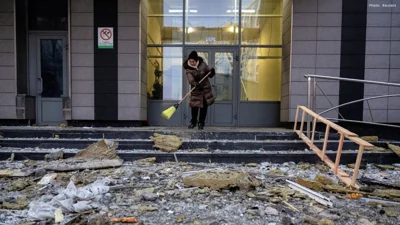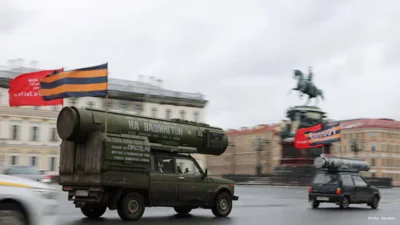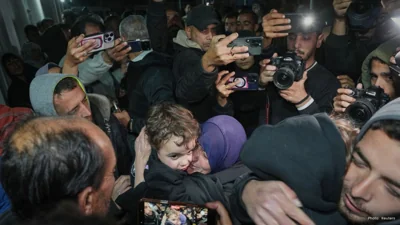
Post by : Monika
Israeli Prime Minister Benjamin Netanyahu has made a bold move by supporting U.S. President Donald Trump’s peace plan for Gaza. For many around the world, this step looks like a chance to reduce fighting and bring hope after months of war.
But inside Israel, the decision is risky. Netanyahu’s far-right political allies are unhappy, and they may even turn against him. This puts him in a very difficult position—trying to balance international pressure with local politics.
This long report will explain what the peace plan says, why Netanyahu chose to support it, how people in Israel and abroad are reacting, and what risks he faces in the coming months.
Why Netanyahu Is Supporting Trump’s Plan
Netanyahu has ruled Israel for many years, and he is known as a strong leader who focuses on security. But the war in Gaza has dragged on for a long time, causing anger and sadness on both sides. Many families in Israel are still waiting for hostages to return home, while Palestinians are suffering heavy losses from bombings and blockades.
Internationally, Israel has faced growing criticism. Even some of its allies have urged Netanyahu to find a political solution, not just continue the fighting. By backing Trump’s plan, Netanyahu hopes to show the world that he is open to peace and diplomacy. This could improve Israel’s image, which has been badly damaged during the conflict.
Another reason is politics at home. Ordinary Israelis are tired of war. They want their leaders to try something new. By agreeing to Trump’s plan, Netanyahu hopes people will see him as a leader who can deliver results, like the return of hostages or steps toward peace. This could strengthen his popularity and help him in future elections.
What the Trump Peace Plan Says
Trump’s Gaza plan is built on 20 main points. Some of them are very tough and may not be easy to carry out. Here are the most important parts explained simply:
Hamas must release all hostages. Many Israelis see this as the most urgent step. Families have been protesting for months, demanding the safe return of their loved ones.
Hamas must give up weapons. This includes rockets, tunnels, and other military tools. It would reduce the threat of new attacks on Israel.
Israel will withdraw troops from parts of Gaza, but step by step. This will only happen if Hamas follows the rules.
Gaza will be run by a temporary committee. This group will include Palestinian experts, supported by international powers. The aim is to rebuild Gaza without giving Hamas control.
Talk of a future Palestinian state. The plan leaves room for this possibility, but only if major reforms are made and Israel’s security is protected.
No role for Hamas in future governance. The plan makes it clear that Hamas cannot take part in running Gaza or in future political talks.
Netanyahu has agreed to most of these points but has set his own conditions. He says Israel will not accept the creation of a Palestinian state as part of this plan. He also insists that Israel must maintain security control in Gaza to prevent new attacks.
International Reactions
Many world leaders welcomed Trump’s plan. They see it as a first step to calm the war and bring peace talks back on the table. Arab countries, including some that have ties with Israel, are watching carefully. They want to see if this plan can bring stability to the region.
For the United States, this plan is also important. Trump wants to show that he can achieve peace in the Middle East, something past presidents have struggled with. If the plan works, it could be seen as a major foreign policy victory for him.
The United Nations and the European Union also welcomed the idea of negotiations, but they remain cautious. They know that previous peace efforts in the region have often failed.
Risks Inside Israel
While Netanyahu may win praise abroad, the bigger danger comes from within his own government. His coalition depends on far-right and religious parties, led by figures like Itamar Ben-Gvir and Bezalel Smotrich. These leaders strongly oppose Trump’s plan.
They believe it gives away too much to Palestinians and ties Israel’s hands in future conflicts. Some have threatened to leave Netanyahu’s government if he pushes ahead. If that happens, his coalition could collapse, forcing new elections or creating political chaos.
This is not the only challenge. Many Israelis support the return of hostages but are unsure about withdrawing troops or discussing a Palestinian state. Public opinion is divided. Some see the plan as hope for peace; others fear it will make Israel weaker.
Netanyahu’s Political Gamble
Netanyahu is known as a very skilled politician. Many experts believe he is not fully committed to the peace plan. Instead, he may be using it as a political tool.
By accepting the plan in public, he shows the world that he is open to peace. But at the same time, he avoids presenting it formally to his cabinet. This allows him to keep his options open. If things go well, he can claim credit. If things go badly, he can blame Hamas or international pressure.
In this way, Netanyahu is gambling. He wants to look good abroad without losing power at home. But such a balancing act may not last long.
The Families of Hostages
One of the strongest voices in Israel right now is the families of hostages. For months, they have organized protests, marches, and vigils. They demand that Netanyahu do everything possible to bring their loved ones home.
For these families, Trump’s plan is a sign of hope. If Hamas agrees to release hostages, it could ease some of the pain that Israelis have felt during the war. But if nothing changes, anger will continue to grow against the government.
The Palestinian Side
For Palestinians in Gaza, life remains extremely hard. Bombings, shortages of food and medicine, and destroyed homes have made survival difficult. Some Palestinians may welcome the idea of international help to rebuild Gaza. But many do not trust Netanyahu or Trump. They fear the plan is more about protecting Israel than giving Palestinians real freedom.
Hamas has not given a clear answer yet. Accepting the plan would mean giving up weapons and control, which they may see as surrender. Rejecting it, however, could bring more suffering to Gaza. This is a very difficult choice.
What Happens Next
Benjamin Netanyahu’s decision to support Trump’s Gaza peace plan is one of the boldest moves of his career. It offers him a chance to rebuild Israel’s global reputation and perhaps end some of the suffering caused by the war. But it also brings huge risks. His far-right allies may abandon him, his government could fall, and Hamas may refuse to cooperate.
In the end, Netanyahu’s gamble could either make him look like a leader who brought peace or one who played politics and failed. For now, Israel and the world are waiting to see what happens next.










Mattel Revives Masters of the Universe Action Figures Ahead of Film Launch
Mattel is reintroducing Masters of the Universe figures in line with its upcoming film, tapping into

China Executes 11 Members of Criminal Clan Linked to Myanmar Scam
China has executed 11 criminals associated with the Ming family, known for major scams and human tra

US Issues Alarm to Iran as Military Forces Deploy in Gulf Region
With a significant military presence in the Gulf, Trump urges Iran to negotiate a nuclear deal or fa

Copper Prices Reach Unprecedented Highs Amid Geopolitical Turmoil
Copper prices soar to all-time highs as geopolitical tensions and a weakening dollar boost investor

New Zealand Secures First Win Against India, Triumph by 50 Runs
New Zealand won the 4th T20I against India by 50 runs in Vizag. Despite Dube's impressive 65, India

BTS Tour Sparks Global Demand: Mexico Appeals for Additional Shows
BTS' comeback tour creates immense demand in Mexico, prompting President Sheinbaum to urge more conc